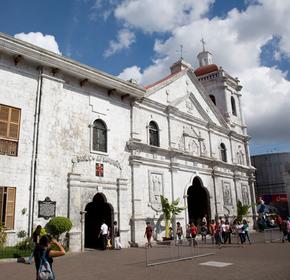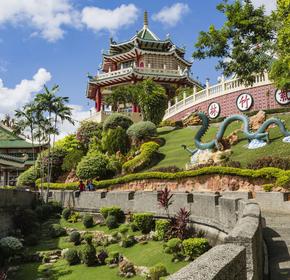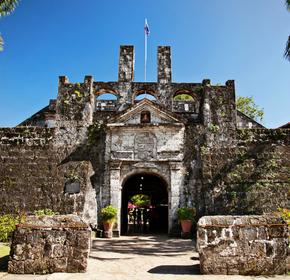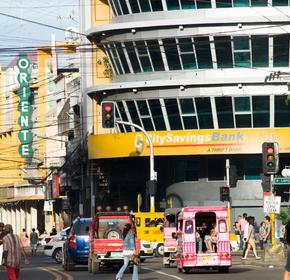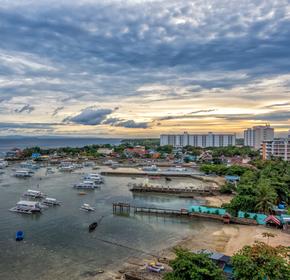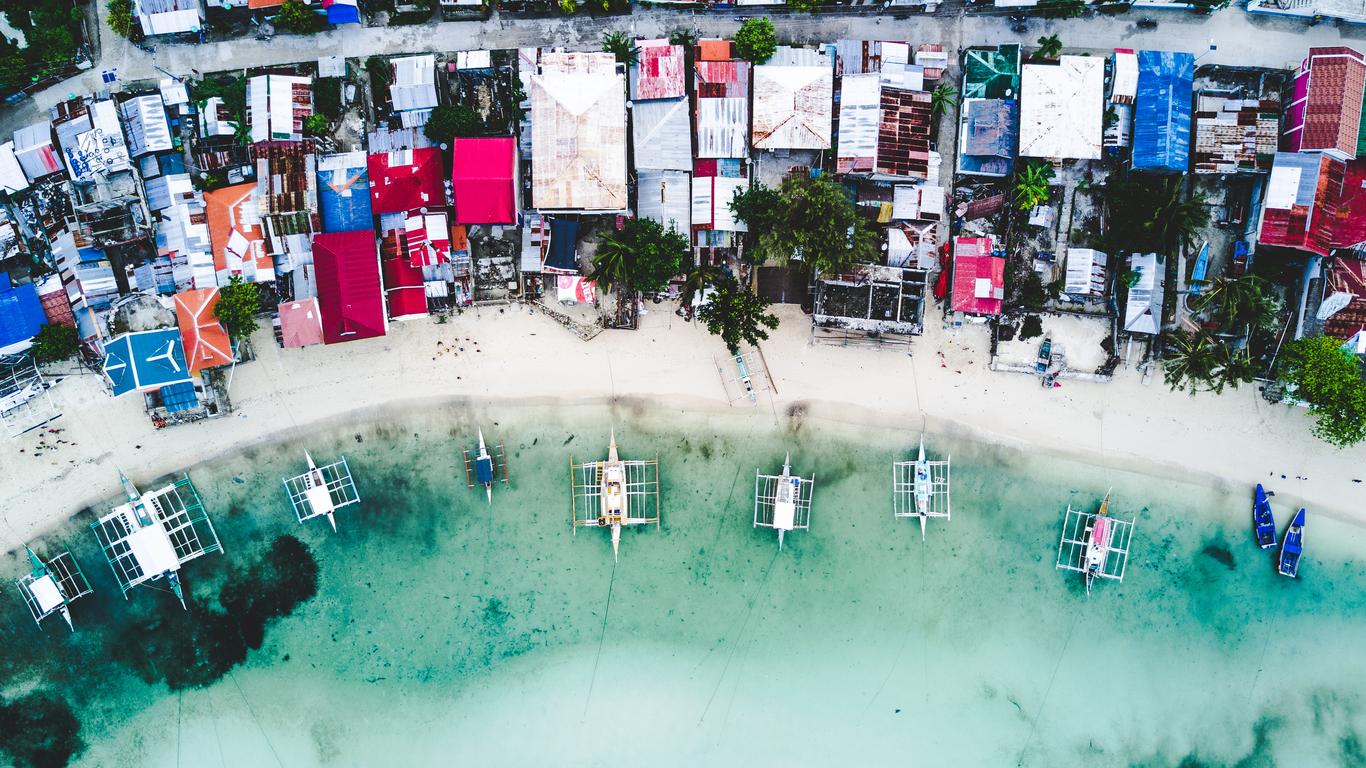
Cebu City travel guide
Cebu City Tourism | Cebu City Guide
You're Going to Love Cebu City
From big city sophistication to pristine white beaches, it's not hard to understand why Cebu City is such a hugely popular tourist destination. It's a place that combines history - it is the oldest city in the Philippines - with a glamorous dining and nightlife scene, set in a lush natural environment.
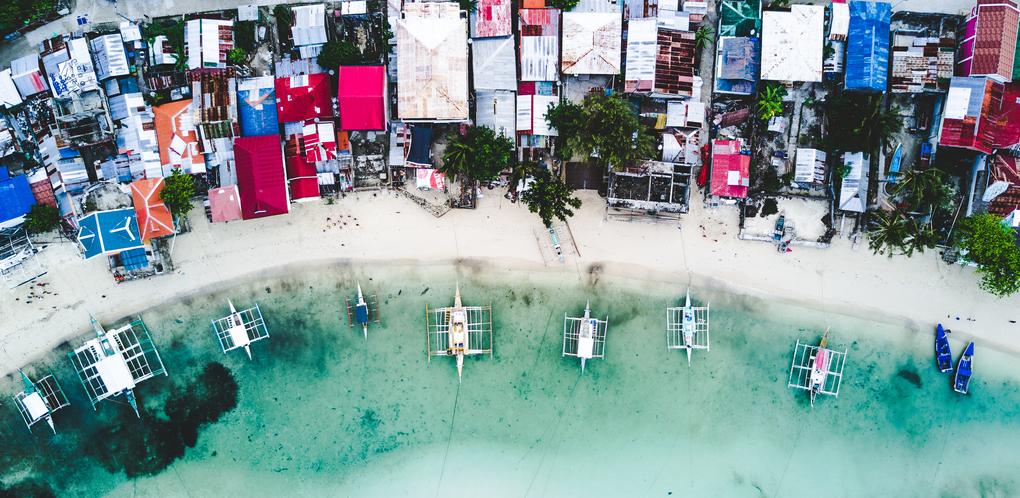
Known as the Queen City of the South, Cebu City is the largest urban area on Cebu Island. It's part of a cluster of islands in the South China Sea south of Manila in the Visayas region of the country. A mountain range runs along the center of the island, with Cebu City lying in the middle along the southeastern coast. The combination of mountains and sea produces an abundance of fresh ingredients for the delicious local cuisine.
You may be surprised at the Latin flavor you'll encounter in some parts of the city, but along with Spanish colonization, Cebu City was an early outpost of trade between the Philippines and Mexico. Put all the ingredients together, and Cebu City offers a rich environment, culture, and cuisine for you to explore.
Top 5 Reasons to Visit Cebu City
1. Enjoy Life on the Water
You'll want to make the most of Cebu City's island location by enjoying the waters, including the soft, white sands of Larawan Beach in neighboring Talisay City, and Marigondon Beach on Mactan Island. Along with the relaxing beach life, you can go diving to explore coral reefs, go whale shark watching, and enjoy some of the best fishing in Asia. There are many resorts with private beaches along the coast.
2. Delectable Cuisine
With its mix of local, Spanish, Mexican, Chinese, Japanese, and other Asian influences, Cebu City's cuisine offers a wealth of delicious options crafted from regional ingredients, including fresh seafood. From ultra-cheap street food to the finest dining establishments, you'll find many choices at any price point.
3. Explore Fascinating History
As the nation's oldest urban center, you'll find plenty of ways to connect with Cebu City's long history. Magellan's Cross was originally planted in downtown Cebu City in 1521, and you can stroll down Colon Street, the oldest road in the country.
4. Outdoor Adventure
The gorgeous landscape of Cebu City and Cebu Island lends itself to outdoor sports of many different kinds, including adventures like spelunking in the caves underneath Talisay or Bantayan, cliff diving, and canyoneering, or jumping down the island's many waterfalls into rushing streams. You can go mountain biking, rock climbing, skydiving, and much more.
5. A Shopping Extravaganza
Cebu City has what you're looking for when it comes to shopping, including the enormous - and famous - SM City Cebu and the Ayala Center Cebu with its lovely terraced gardens. You'll also find many other shopping opportunities from street vendors to themed malls, and many include entertainment options like the huge skating rink at the SM Seaside City Mall.
What to do in Cebu City
1. Basilica del Santo Niño: Mother of all Churches
This centuries-old Cathedral at the heart of Cebu City is the oldest Roman Catholic Church in the Philippines and is historically fascinating. Time-worn and atmospheric, the building is an emblem of the birth and spread of Christianity in the country. From frescoes to statues, everything about the interior exudes that important role - particularly the awe-inspiring Image of Santo Niño. Nearby, Ferdinand Magellan's Cross commemorates the 16th-century arrival of the explorer in the Philippines.
2. Cebu Taoist Temple: Hilltop Worship
While Christianity became widespread in the Philippines with the arrival of the Portuguese, other religions continue to thrive. This Taoist temple is a contemporary wonder, with an enormous dragon statue welcoming visitors from the hillside. A replica of the Great Wall of China forms the entryway, through which tourists and worshippers step into the colorful chapel. Wander the premises to discover the library, wishing well, and balconies - from which you'll find gorgeous views over Cebu.
3. Fort San Pedro: Centuries of Conquest
Strategically placed at the heart of the first Spanish settlement in the Philippines, this fort has overlooked the water from Cebu Pier for centuries. As you wander the dramatic ramparts, your imagination will run wild as you learn about the long history of military defense in the Pacific. Just outside, Plaza Independencia marks the country's independence from the Spanish, and it is a perfect place for a bit of R&R.
4. Colon Street: First Street in the Country
Hundreds of years ago, Colon Street, became the first road established in the Philippines. Today, it is a commotion of vendors, shops and jeepneys. With the sights and sounds of today's city, it can be hard to imagine a typical day of centuries past, but a walk along the stretch reveals lingering evidence and layers of history. Look for commemorative stones along the side of the road observing notable landmarks, and deepen your understanding of the country.
5. Lapu-Lapu City: Escape to Mactan
A short trip from Cebu City, this coral island across the bridge is the closest getaway around. Enjoy the beaches on the sparkling water, pamper yourself in a resort, or use Mactan as your starting point for an island hopping adventure. Snorkeling and water sports are the most popular activities here, and boat rentals for excursions into the Bohol Strait are just as easy to arrange. Maybe even try something new like deep sea diving or water-skiing!
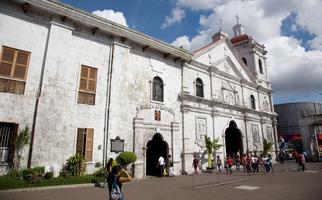
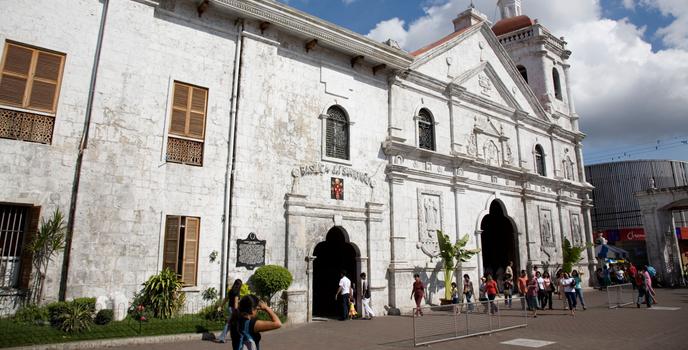
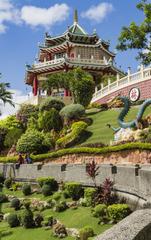
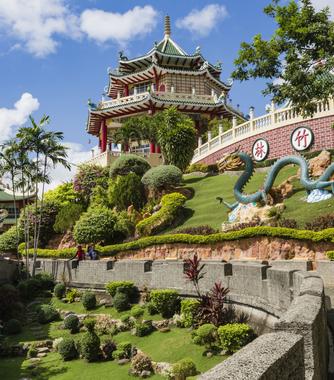
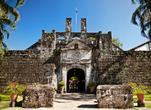
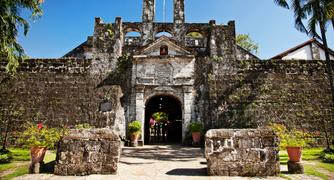
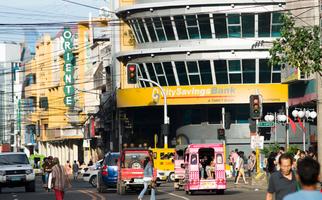
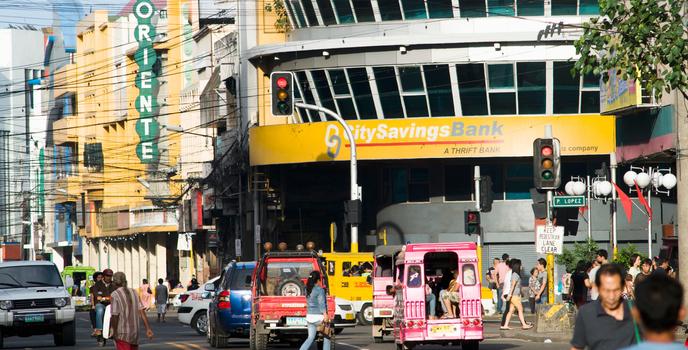
1. Basilica del Santo Niño: Mother of all Churches
This centuries-old Cathedral at the heart of Cebu City is the oldest Roman Catholic Church in the Philippines and is historically fascinating. Time-worn and atmospheric, the building is an emblem of the birth and spread of Christianity in the country. From frescoes to statues, everything about the interior exudes that important role - particularly the awe-inspiring Image of Santo Niño. Nearby, Ferdinand Magellan's Cross commemorates the 16th-century arrival of the explorer in the Philippines.
2. Cebu Taoist Temple: Hilltop Worship
While Christianity became widespread in the Philippines with the arrival of the Portuguese, other religions continue to thrive. This Taoist temple is a contemporary wonder, with an enormous dragon statue welcoming visitors from the hillside. A replica of the Great Wall of China forms the entryway, through which tourists and worshippers step into the colorful chapel. Wander the premises to discover the library, wishing well, and balconies - from which you'll find gorgeous views over Cebu.
3. Fort San Pedro: Centuries of Conquest
Strategically placed at the heart of the first Spanish settlement in the Philippines, this fort has overlooked the water from Cebu Pier for centuries. As you wander the dramatic ramparts, your imagination will run wild as you learn about the long history of military defense in the Pacific. Just outside, Plaza Independencia marks the country's independence from the Spanish, and it is a perfect place for a bit of R&R.
4. Colon Street: First Street in the Country
Hundreds of years ago, Colon Street, became the first road established in the Philippines. Today, it is a commotion of vendors, shops and jeepneys. With the sights and sounds of today's city, it can be hard to imagine a typical day of centuries past, but a walk along the stretch reveals lingering evidence and layers of history. Look for commemorative stones along the side of the road observing notable landmarks, and deepen your understanding of the country.
5. Lapu-Lapu City: Escape to Mactan
A short trip from Cebu City, this coral island across the bridge is the closest getaway around. Enjoy the beaches on the sparkling water, pamper yourself in a resort, or use Mactan as your starting point for an island hopping adventure. Snorkeling and water sports are the most popular activities here, and boat rentals for excursions into the Bohol Strait are just as easy to arrange. Maybe even try something new like deep sea diving or water-skiing!








Where to Eat in Cebu City
Take full advantage of the tropical locale at Anzani, where you can enjoy the terrace and views of the city from Panorama Heights and feast on a menu of Italian and Mediterranean cuisine that starts at ₱400. Savor classic Asian and Filipino dishes, including mouthwatering barbecue dishes, at Larsian, with mains starting at ₱250 in a casual and family-friendly atmosphere. For sleek, modern ambiance and Pan-Asian fare, choose the Garden Cafe at the Marriott Hotel, where main dishes start at ₱900.
When to visit Cebu City
The drier season between December and May is the most popular for tourist visits, although the rains are only occasional and storms infrequent during the remainder of the year. Temperatures usually range from 75 to 95 degrees Fahrenheit, with the hottest month being May.
How to Get to Cebu City
Plane
The Mactan-Cebu International Airport (CEB) is a modern facility that handles both domestic and international flights. It is located in Lapu-Lapu City on Mactan Island, just over 9 miles from Cebu City along the Central Nautical Highway. MyBus offers regular service daily to the SM City Mall for ₱25. An official yellow airport taxi to town typically costs about ₱400-500.
Car
You will need patience and stamina to negotiate the traffic in and around Cebu City, and you should be forewarned that you will not be able to take your car to many of the smaller surrounding islands. Cebu City is home to a busy port, and there are ferry connections to Manila, Butuan City, and other locations; some ferry trips accommodate cars. The Central Nautical Highway skirts the coast of Cebu Island, connecting Cebu City to Mandaue City and further afield to the north, and Naga and beyond to the south. Cebu-Toledo Wharf Road traverses the mountains across the island with connections to Toledo City.
Bus
Cebu City is a hub for bus travel around the island, including air-conditioned service via Ceres Liner to Bato and other locations. Other major companies include Jegans, Gabe Transport, and Metrolink.
Airports near Cebu City
Airlines serving Cebu City
Where to stay in Cebu City
Colon - this downtown area centers around Colon Street, said to be the oldest and shortest street in the country. This is where you'll find most of the city's historic attractions like the historic Fort San Pedro and the iconic Magellan's Cross, and many value-priced hotel options like the Cebu Century Hotel.
Popular Neighborhoods in Cebu City
Fuente Osmena - this park in the center of town, at the middle of the Fuente Osmena traffic circle, is a century-old meeting place for locals. It is also a commercial hub near shopping and dining options in the Mango Square Mall and ultra-modern Robinsons Galleria Cebu, and the Carcar Public Market, great for cheap street food.
Mactan Island - this neighboring island is where you'll find some of the area's best beaches. There are many luxury hotels and resorts here like Shangri-La's Mactan Resort & Spa, along with connections to water-based activities.
Where to stay in popular areas of Cebu City
Most booked hotels in Cebu City
How to Get Around Cebu City
Public Transportation
To travel like a local, choose a jeepney. These colorful, privately run minibuses cover the whole city 24 hours a day, but there is no way to check schedules or routes in advance. The routes are printed on the sides of the bus, and the fare is ₱7. Bus routes tend to run north to south only, making it a limited option. Rapid bus and hybrid electric train systems are being planned and built for the city, with service scheduled to begin in late 2017 or 2018.
Taxi
There are taxis everywhere in Cebu City, and you can avoid overcharging hassles by choosing one of the many white taxis, where the prices are printed on the side. Be sure to use metered service. Trips within the city should run ₱100 or less.
Car
Driving in Cebu City's horrendously crowded streets isn't recommended, especially with so many taxis throughout the city and parking being very limited. A car rental will let you easily explore outside the city on Cebu Island - as long as you're patient and leave plenty of time to leave the city limits. A compact rental starts at about ₱3,600, and local companies include Safe Ride Car Rental and Cebu Easy Rent-A-Car.
The Cost of Living in Cebu City
Shopping Streets
Along with the major shopping centers located in the Cebu Business Park and the North Reclamation Area, you'll find a large bazaar with local goods on Manalili Street, a great place for bargains on clothing and accessories. The huge Carbon Market on MC Briones Street is the largest farmer's market in the city and you'll find a wealth of produce and other foods, along with clothing and souvenirs.
Groceries and Other
Shopwise Supermarket and Rustan's Supermarket are two of the many grocery brands you'll find in town. There are also grocery stores at all the major shopping malls. A quart of milk costs about ₱19 and a dozen eggs costs about ₱16.
